A Cruel and Suicidal Decision--A Humanitarian Disaster
February 26, 2022
What is Patriotism--What Does It Depend on?
February 5, 2022
Yale Professor Steven B. Smith’s book, Reclaiming Patriotism in an Age of Extremes, was heavy going in the beginning for me. An abundance, perhaps too many, references to ancient and renowned philosophers and political thinkers. However, page by page, chapter by chapter and particularly with the last one, I became more impressed. In the end, I am filled with admiration for this book as Smith convincingly pinpointed the differences between Patriotism, which embraces the best values in America without claiming perfection or denying the worth of other countries; Nationalism, which too often excludes or disrespects others; and Cosmopolitanism, which can become too utopian and unrealistic.
I have also gleaned how the feeling of patriotism which Professor Smith describes can attach in special circumstances not only to our nation but also to an institution or company where one spends their career, in my case, Procter & Gamble.Smith, not entirely correctly in my opinion, argues that America was the first, and perhaps still is the only, nation founded on a creed. We are a creedal people, he asserts. We keep referring back to our Founding Fathers, to our Constitution and to our Bill of Rights to a degree the citizens of no other country do--even if we argue intensely as to what is the right interpretation of the Constitution. (I write "not entirely correctly" because while our frequent reference to our Constitution is unique, the leadership and peoples of other nations will say and to varying degrees believe they are pursuing a "creed" based vision).There are perspectives which Steven Smith’s book illuminated for me that I believe are very important:One is “the ethos of society.” Professor Smith writes that Patriotism requires "not only an understanding and appreciation of a set of abstract ideas, but also their embodiment in a particular history and tradition." He writes, , “The ethos of a society embodies those traits of character that are normative for the community.” They embrace the “kinds of persons and personality traits (who) are deemed desirable (and) or kinds of actions and policies that are worthy of respect.”There won’t be universal agreement on what those policies and actions were in our nation’s history. However, I believe there will be broad agreement, for example, that Abraham Lincoln’s principles and determined and courageous leadership were what we needed; that Martin Luther King lived a correct and admirable commitment to non-violent protest to advance the right of minorities; that men and women sacrificing their lives in World War II to preserve the democracy of this country --these all were were irreplaceable, admirable deeds. There would also be broad agreement on things that have been carried out by our Nation that are not admirable: lynching, Jim Crow, the appropriation of Native American lands, the internment of the Japanese in WW II.The only way to preserve and build on our creed and our Purpose-- the only way to make the ethos of the place real, is by: 1) Results-- demonstrating the ability to take actions needed to progress to achieving the Purpose; 2) Transparency--describing the bases for our actions explicitly in terms of the values they embody and 3) Sharing learning and history--telling memorable stories of how the Purpose has been fulfilled in ways we admire or in ways that fail to measure up to fulfilling our Purpose. achieve at our best. That's how one continues to learn, thereby sustaining the Purpose and continuing to improve in achieving it.
Every institution, whether it be our Nation, a company like P&G, a university like Yale or a cultural center like the National Underground Railroad Freedom Center which I have been part of for 25 years, needs to be clear on its Creed or its Purpose. It needs to understand the ethos it has and which it seeks to build and what are the actions and values and the storytelling that will make that not just a bunch of abstract thoughts but descriptive of an entity to which one wants to commit his or her very best effort and a good part of their lives. This is what produces Loyalty and Patriotism.Loyalty and a spirit of Patriotism have to be earned by what the institution is setting out to do, by how well and consistently it is doing it, by living its values in practice, and by how successful it is it is in continuing to do better, despite inevitable setbacks, tomorrow than it is today.Professor Smith provides a good service to the reader in defining the nature of the "Patriotism" we should seek. What he does not address--nor do I believe it was his intent--is to what degree our Nation today is earning the loyalty and the Patriotism he so well describes or, even more to the point, what can be done to strengthen it.I worry greatly that the foundations of Patriotism have been dangerously weakened. Citizens trust in the government has plummeted. Pew reports that the percentage of Americans saying they trust the federal government's decisions most of the time plummeted from 73 percent in 1958 to just 19 percent in 2019. Trust in other major institutions, including religion and schools (only the military has been immune), has also declined precipitously.Respect for "truth" and the commitment to a common, shared cause so necessary to support Patriotism have been been shattered by a lack of value based leadership, particularly revealed though not started by Trump. Now, following the first year of the Biden Administration, beset with the overhanging pall of Covid, the impact of climate change and the competitive threat of China and and other geo-political challenges, we are shaken by concerns about sheer governmental competence, i.e. is our government being led by capable people able to get done what they have promised and are expected and need to do?I don't have a confident answer to what can be done to "Reclaim Patriotism", returning to the title of Professor Smith's book--other than to say it depends on leadership. There's nothing new about that. We have always depended on strong leadership at times of crisis. Leaders able and brave enough to face reality, frame a uniting vision, marshal a clear and compelling strategy and take actions which, even if imperfectly, lead to substantive progress toward that vision.I also know that I (and all of us) have a personal responsibility--a responsibility to work to the best of our abilities to make the life and the lives of people we touch better because we are where we are.
Words to Sign On To--Viktor Frankl--The Need for "Decent People"
February 4, 2022
Viktor Frankl's "Man's Search for Meaning" is the single most inspiring book I have ever read. Published 55 years ago it continues to speak for me to the challenging period in which we live today.
Frankl concludes his book by urging us to rather than talk about "Saints" to just talk about "decent people". He acknowledges that they may be a minority; if so, it is our challenge is to join them. "For the world is in a bad state", Frankl asserts, "but everything will become worse unless each of us does our best".
Those simple words are ones to sign on to: Doing our best, for ourselves and for others on the path of life. Being kind. Seeking truth. Yes, "being decent".
Minutes after posting this blog, a good friend of mine wrote saying in essence that "being decent" doesn't seem like a very high bar; so what gets in the way of achieving it.
What One Lives For--Joseph Conrad
January 28, 2022
From Joseph Conrad
"What one lives for may be uncertain; how one lives is not. Man should live nobly though he does not see any practical reason for it, simply because in the mysterious, inexplicable mixture of beauty and ugliness, (and) virtue and baseness in which he finds himself, he must want to be on the side of the virtuous and the beautiful."
I offer one caveat to this inspiring quotation-- an important one. Personally, I have found there are "practical reasons" for trying to live nobly. Doing so earns the respect and trust, not of everyone but of many including those whose trust and friendship we most value. And, if nothing else, doing so let's us sleep better at night.
Whither Ukraine?
January 27, 2022
Whither Ukraine?
January 24, 2022
"If a nation values anything more than freedom, it will lose its freedom; and the irony is if it is comfort or money that it values more, it will lose that too."
Somerset Maugham, 1941. As relevant and poignant today as 80 years ago.
To which I would append,
Freedom means freedom and opportunity for all. And with freedom --indeed making freedom possible--comes responsibility.
A Trip of A Lifetime with My Son, John--As Recorded by Him--Too Precious Not to Share
January 9, 2022
Zen and the Art of Changing a Windshield Wiper
BY JOHN PEPPER · PUBLISHED JANUARY 6, 2022 · UPDATED JANUARY 7, 2022
They tell us to enjoy the journey, not to focus solely on the destination. For too many years of my life, despite having heard that advice and even believing it, I wasn’t able to pull it off. I was always looking for more, for better, for what lay ahead. Unknowingly dismissing what was happening in the moment as not good enough or worthy of gratitude.
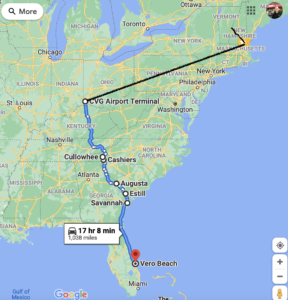
A few weeks ago, my 83-year old Dad and I took a 3-day road trip from Cincinnati to Vero Beach, Florida. Our tangible objective was to safely transport my mom’s 2000 VW Bug to its new home where my parents and our family gather at times during winter months. It wasn’t being used in Cincinnati, and instead of selling it or giving it away, we decided to make a journey out of it.
OK – so attempting to compare our trek in a red bug to Robert Pirsig’s epic Zen and the Art of Motorcycle Maintenance might be a stretch. However, in the days leading up to our departure we nearly canceled our plans not less than three times. Who has time to sit in a car for 3 days? What about work, kids, commitments, and wouldn’t we see each other on the beach a few days later anyway? I knew I would end up doing all the driving… and also figured Dad would be asleep within minutes. But somehow we kept it on the books. Too often, when we face something that isn’t productive in the eyes of today’s fast-moving, success-at-all-costs society, it’s easy to fall into the trap of moving such distractions aside. This one would have been an easy discard; hire a guy to drive the bug to Florida, we all fly down a few days later, as originally scheduled, and voila, vacation begins.
That’s not what happened.
On Sunday morning I woke early to catch the Dartmouth Coach from Hanover, NH to Boston. The bus plowed through fresh snow on I-89 and arrived at Logan airport on time. It takes a lot of weather to stop those buses from running. A few inches of snow and sleet and ice put a few cars off the side of the road but not the Dartmouth Coach.
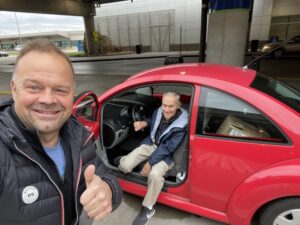
The flight to Cincinnati/Northern Kentucky airport was smooth until we landed just before 1pm and had to wait 40 minutes for the understaffed ground crew to get us parked at the gate. Another 30 minutes for the bags to get to the carousel. And we were off.
Since I’m not Robert Pirsig, I should probably stop here. In fact, our in-the-moment pictures tell the story more eloquently than I ever could… pictures really are worth 1,000 words and often more. I’ll give it a shot anyway.
Our first stop was a Starbucks in Walton, KY. Our next stop was a Starbucks in London, KY. The only reason these are noteworthy is because there are Starbucks in towns most of us have never even heard of. It seems like yesterday that I would drive up to Burlington, VT – 80 miles from our old home in Norwich – to get a cup of Starbucks brew. Getting to a Starbucks on a road trip meant deviating from your normal route. Today, it’s almost like McDonalds. All drivethrus. And even though the lines are devastatingly long and slow, people seem to keep sitting in them for 20 minutes or more to get their special blended beverage.
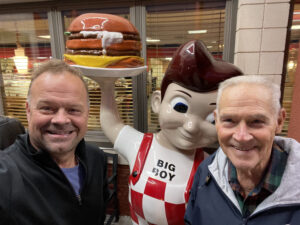
I grew up on Frisch’s Big Boys, so that was our first real stop. It didn’t disappoint. It was exactly as I remembered – that was also in London, KY.
Soon after we crossed into Tennessee. I rowed at Oak Ridge while on the Crew team in high school. I don’t think I’ve been to Tennessee since. It was dark so we didn’t see much. As we passed by Knoxville and night had settled in, we both agreed were it not for our goal of making it to my sister’s home about an hour outside of Ashville, NC, we would have stopped for the night at that point. Finally around 9pm we pulled into their small farm in the small town of Cullowhee, NC – home of Western Carolina University.
After a good night’s sleep, Dad getting to catch up with 2 of the youngest of his 10 grandchildren (who went to school late to spend time with him), we were on our way again. Today we decided to avoid the interstates (and the Starbucks) and take the scenic route. We were in no hurry after all. Nobody was waiting for us on the other end.
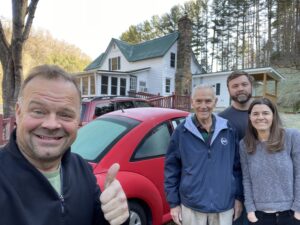
Our first stop was in Cashiers, NC where we found a cozy little coffee shop called, ironically, Bucks. We continued on into South Carolina and made our way towards Augusta, Georgia where we thought we’d do a quick drop-in on the Augusta National Golf Club, home of the Masters. Going from beautiful rural scenery to a sea of fast food chains on an endless slab of concrete was disconcerting on its own, but seeing that the golf course was completely shut off from viewing let alone entry was another eye opener. We did a quick tour around the edges hoping to find a break in the vinyl that covered the perimeter fences before giving up and moving on. We won’t try that again.
We skirted the border of SC and GA for the next few hours, stopping in Estill, SC for gas. For the evening we stopped at a beautiful hotel in Savannah called Perry Lane.
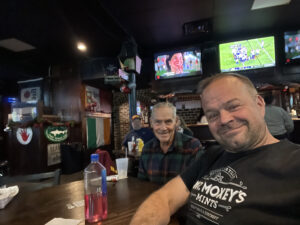
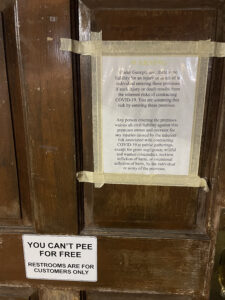
We were defaulting to the fancier restaurant in the hotel until Dad spied a dive bar across the street and wanted to check it out. The signs on the entry door made me almost certain that Dad would not want to continue on, but he opened the door undeterred. I took off my button-down shirt leaving my t-shirt to make sure we didn’t stand out too much. The food was good, the service super friendly, and I’m not sure they would have allowed us to wear masks if we had wanted to. Neither of us got Covid (we tested every few days in Florida) – I can imagine it would be in just such a place one would catch Covid. (In the weeks that have passed since, of course, it turns out everyone can get Covid anywhere, anytime, masked or unmasked.)
The final stretch on Tuesday started in heavy rain before sunrise. That’s when we figured out the hard way that the proving-to-be trusty 2000 VW bug did not have working windshield wipers. They went back and forth just fine, but nothing really happened to the water and streaks on the windshield.
I stopped at a Love’s Truck Stop just outside of Savannah, measured the wipers we had, and went in and purchased slightly smaller ones so that the slapping sound we were never going to get used to might lessen just a bit. Changing a windshield wiper is pretty straightforward, but you still need to know just a little bit about it to not look like a complete incompetent. So I pulled up a quick YouTube video while waiting in line to purchase the blades.
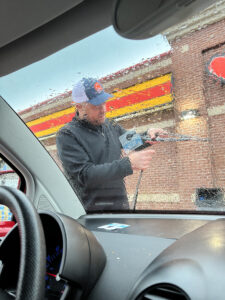
When I got back to the car it was still raining, but I was able to fairly quickly install the new wipers. I was quietly impressed with myself, and I realize how pathetic that sounds to many. But better than that, my Dad was there staring at me from the passenger seat literally blown away at my automotive maintenance and repair expertise. Not only did he take a picture, but he proceeded to bring it up with other family members on many occasions in the days that followed, perhaps to provide evidence that he had raised a good son. Who knew that changing windshield wipers at a Truck Stop in Georgia could help my personal stock increase so fast and quickly?!
We did resume our Starbucks stops for the 6 hours that remained of our drive. And we caved and I got Dad to try Chick-Fil-A for the first time.
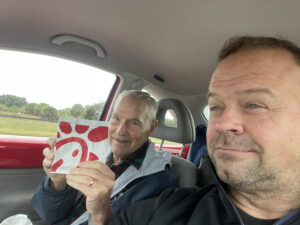
Sidebar: Ironically today – literally – Chick-Fil-A opened their first location in the city of Boston in our old Copley Square Boloco location… bittersweet. There’s nothing wrong with the Chick-Fil-A chicken sandwich, but there’s nothing super special about it either. It’s always good. It’s always the same. It never makes me feel like shit, and I guess that’s a big win for fast food. The Chick-Fil-A founding family’s anti-gay marriage stance really upset Mayor Menino ten years ago and he essentially blocked them from opening in the city… but in the end, it’s not morals or politics that wins. It’s a decent chicken sandwich with a pickle on top and a lot of marketing to offset the controversies that have been relegated to many years ago (like way back in 2019).
We arrived in Vero Beach with another 24 hours to ourselves before Mom and her sister helen showed up and a few days later my brothers and their families. It was a wonderful time to be with family over the holidays, but the time in the car with my Dad from Cinci to Vero will never be forgotten. We talked about everything and nothing, we laughed, we solved problems the world over, we got a little tense on some past Boloco challenges where he and I disagreed, we laughed more. I don’t think he ever slept while we drove, and that’s a first. And I never got tired. We tried to listen to a few podcasts and music, but realized quickly we were better off just the two of us either in silence or speaking or listening. It was perfect.
Knowing the chances were slim we’d do something like that again, I came up with a great idea the other day and ran it by him. “Dad, I’ve got to do something with this Airstream. I’ll drive to Cinci, pick you up, and let’s do it all over again.” He was busy doing something and had to go. My 1981 Airstream Excella – the RV type, not the trailer type – is getting destroyed up here in New England. At least if it was in Florida I would have thousands of buyers if I chose to sell it. No brainer, right? Life is short. Or maybe not.
When I asked him about it this morning, he said “that might be problematic. Why would we drive that thing down there when we could just fly?” I smiled. We don’t change easily.
But maybe after he reads this he’ll agree that we have another trip in us. Maybe.
